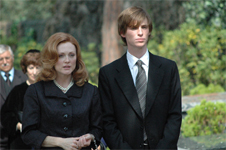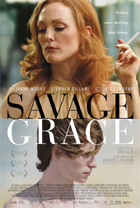Savage Grace
|  Rarely has a film lived up to its marketing hook so thoroughly. Rest assured that Savage Grace, Tom Kalin’s provocative but frustratingly shallow true-life portrait of a wealthy American family’s interpersonal debauchery, proves quite convincingly that “Truth is more shocking than fiction.” The film is indeed shocking, especially if you go into it as I did with little or no knowledge of the true events behind the film (for those who don’t know and don’t want to know before experiencing the film firsthand, abandon this review now). Unfortunately, Kalin doesn’t manage to do much more than create an effectively discomfiting experience--a fly-on-the-wall view of human collapse that slowly draws you into a melodramatic downwards spiral that moves from cruelty to madness to incest and ultimately to murder. Rarely has a film lived up to its marketing hook so thoroughly. Rest assured that Savage Grace, Tom Kalin’s provocative but frustratingly shallow true-life portrait of a wealthy American family’s interpersonal debauchery, proves quite convincingly that “Truth is more shocking than fiction.” The film is indeed shocking, especially if you go into it as I did with little or no knowledge of the true events behind the film (for those who don’t know and don’t want to know before experiencing the film firsthand, abandon this review now). Unfortunately, Kalin doesn’t manage to do much more than create an effectively discomfiting experience--a fly-on-the-wall view of human collapse that slowly draws you into a melodramatic downwards spiral that moves from cruelty to madness to incest and ultimately to murder.The film is highly effective in keeping you intrigued, but it fails to burrow into the characters’ psyches and offer some kind of explanation or reason for what we witness. Of course, there is always the argument that there is no explanation, that the kinds of traumatic events that take place in Savage Grace transcend any kind of reasoning and are best left open for the viewer’s interpretation (Kalin took a similar approach to the Leopold and Loeb story in his only other feature film, 1992’s Swoon). Yet, it’s hard to escape the feeling that Kalin and screenwriter Howard A. Rodman, who adapted Natalie Robins and Steven M.L. Aronson’s 1985 book, are simply too enthralled with the twisted surface mixture of glamour and perversity to go more than a few steps beneath. It really hit home to me when the closing credits inform us of the eventual fate of one of the main characters. After telling us that he committed suicide, there is a pause before a final sentence fades in to inform us that he did so by tying a plastic bag around his head. It’s a gruesome and, as it turns out, darkly ironic detail, but the manner in which it is unveiled as a stand-alone statement makes it feel like an unnecessary jab, making it all the more obvious that the film’s fascination with grotesquerie far outweighs any humanistic interest in the characters’ tortured inner lives. The story unfolds over roughly three decades, from 1946 to 1972. The central characters are Brooks Baekeland (Stephen Dillane), the grandson of the chemist who invented the first sustainable synthetic plastic and, as a result, ensured that his family would be immensely wealthy for generations, and Brooks’ wife Barbara (Julianne Moore), a former aspiring actress turned pushy socialite. Because they have no need to work and all the money they need, Brooks and Barbara live a rootless, pampered existence that consists primarily of entertaining the wealthy and powerful elites of America and Europe. When we first meet them in New York City in 1946, it is already clear that there is great tension in their relationship. Barbara, with her flaming red hair and clear-cut aspirations, is like a knife constantly cutting at the debonair, arrogant rock that is Brooks. It doesn’t take much to realize that knife blades, however sharp, will eventually break against stone. Yet, the film’s central relationship is between Barbara and her son, Tony, who is a baby in the film’s opening passages. We later see him as a precocious 11-year-old (Barney Clark) tagging along with his mother in the streets of Paris, and the second half of the film depicts him as a restless young man in his early 20s (Eddie Redmayne), constantly moving with his family from one fabulous European resort to the next. Tony’s homosexual inclinations manifest early in his life, and the one time he brings home a girlfriend (a Spanish beauty played by Elena Anaya), she ends up in the arms of his father, who ultimately leaves Barbara for her. This desertion marks the beginning of a new era in Barbara and Tony’s lives, in which they become both increasingly close and increasingly fractious, relating to each other in ways that are both unseemly and unnatural. Even the most jaded audiences will likely stir in discomfort during the scene when Tony crawls into bed with his mother and Sam Green (High Dancy), a bisexual high-society walker with whom Tony has already had an affair. And later, when the film presents us with a graphic portrait of mother and son having sex, it is clear that any semblance of normality and even sanity has gone out the window and the only thing left is a murderous eventuality. Savage Grace is largely dominated by Julianne Moore, who invests Barbara with the kinds of ambition, sadness, and rage that make her simultaneously pathetic and contemptible. Even though much of her behavior goes completely unexplained either directly or subtextually (Why, for example, does she have young Tony read from the Marquis de Sade at a dinner party? Why does she end up seducing him?), Moore makes the character feel almost complete, even if she exists in a fragmented narrative that doesn’t give us enough to fill in the glaring blanks for ourselves. Not surprisingly, many of the other actors have a hard time holding the screen with her, especially Eddie Redmayne, who is too much of a blank slate to make an impression. The fact that Savage Garden is a largely empty experience is partially due to the story, which is so sad, so pathetic, and so relentlessly morose that you can’t help but feel blighted by the end. In this sense, the film is quite effective in replicating the emotional turmoil of a three-decade downward spiral, but its conventional linear portrait still requires more depth and attention to the characters’ plights. By the end of the film, we have little more than nagging, unanswered questions, especially about the extreme nature of Barbara and Tony’s ill-fated relationship. If you’re anything like me, it will spin you out to other sources, and in an hour’s reading I learned infinitely more about the Baekelands than the film had presented, which made them much more intriguing, if not particularly sympathetic. While Savage Grace is likely intended to be a familial tragedy for the ages, with its Oedipal disasters and lurking insanity, its lack of depth ultimately dooms it to being little more than a sensationalistic warning fable about idle hands and money being the root of all evil. Copyright ©2008 James Kendrick Thoughts? E-mail James Kendrick All images copyright © IFC Films |
Overall Rating: 
 (2)
(2)


